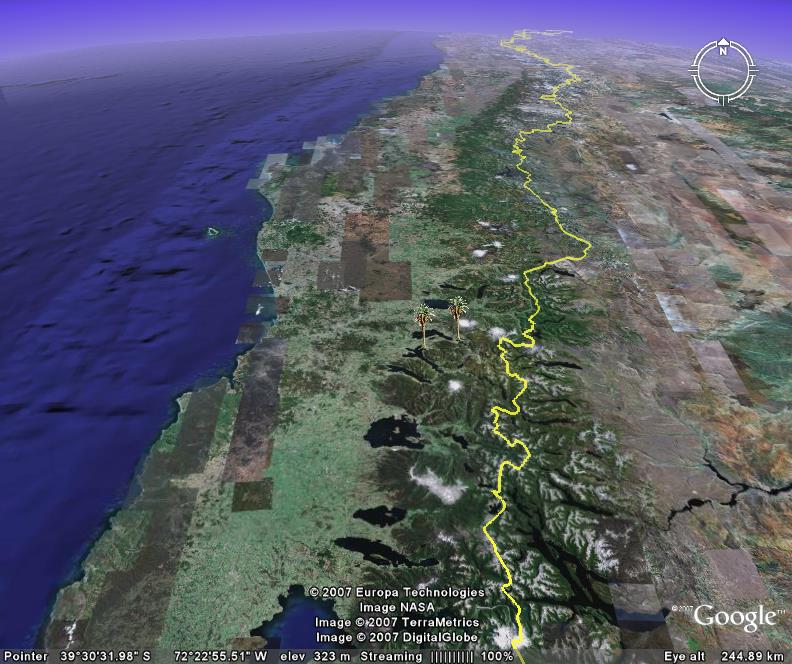Video, slideshow and more on IRRI’s work.
The benefits of sharing
A post in Google Earth Blog alerted me to the great efforts by staff and students at the Faculty of Agronomy and Forest Engineering at the Pontificia Universidad Catolica de Chile to geo-tag the specimens in their herbarium. They’ve produced a Google Earth kml file to show hundreds of collecting locations throughout the country. Below are the localities of Persea lingue, a congener of the avocado, though I’m not sure how closely related they are. It’s threatened, according to IUCN, and indeed there’s only a couple of specimens in the herbarium, quite near each other:
Pssst! Wanna PhD in ABD?
Hannes Dempewolf in British Columbia forwarded a message about the International Doctorate in Agrobiodiversity offered by the Sant’Anna School of Advanced Studies of Pisa in Italy.
Bamboo galore
The latest issue of FAO’s NWFP-Digest seems to be joining in with the celebrations of the 10th birthday of the International Network for Bamboo and Rattan (INBAR). In addition to the International Bamboo & Rattan Expo in Guangzhou, China (see map), it points to a new technique from India for rapid bamboo propagation, the manufacture of bamboo bicycles in Ghana, the sale of bamboo socks in the UK and the planting of bamboo in Bhutan. There’s lots of other stuff too, though.
LEISA speaks up for itself
I’ve done quick nibbles about LEISA Magazine before, most recently on the issue on seed systems, but it really does deserve more of a write-up than that. Which is why it’s such a pleasure to welcome the following contribution to our blog by Karen Hampson, Editor/Researcher at the Centre for Information on Low External Input and Sustainable Agriculture.
The LEISA Magazine on Low External Input and Sustainable Agriculture documents and exchanges information on practical field experiences covering technical, ecological, social and economic aspects of small scale sustainable agriculture. It offers an opportunity for those working in agricultural development, particularly in diverse, risk-prone and resource-poor regions, to publish their experiences and to read about the experiences of others. LEISA Magazine is published four times a year, and each issue deals with a particular theme.
In the current issue of the LEISA Magazine, “Securing Seed Supply,” we present articles from around the world, in which communities describe how they have used various methods to secure their own seed supply. Examples include efforts to conserve traditional rice seed in Sri Lanka, farmer’s seed clubs in Vietnam who rehabilitate and select preferred varieties, and how farmers have improved seed potato in Kenya, using very simple methods. You can also read about how farmer managed natural regeneration has transformed Niger, and how farmers in the Philippines ensure they have enough sweet potato vines to plant, despite difficult local conditions. As a follow-on from our issue on ecological processes (Issue 22.4), the Field Note is from Iraq, describing some experiences with testing out the system of rice intensification (SRI). You can also see our regular items, suggesting books and websites where you can find more information and contacts about this topic.
Â
We are also looking for articles relating community experiences in the following upcoming themes: “Ecological Pest Management” and “Green and Fair Trade.” Details and author guidelines can be found on the website, or contact me at k.hampson@ileia.nl.
